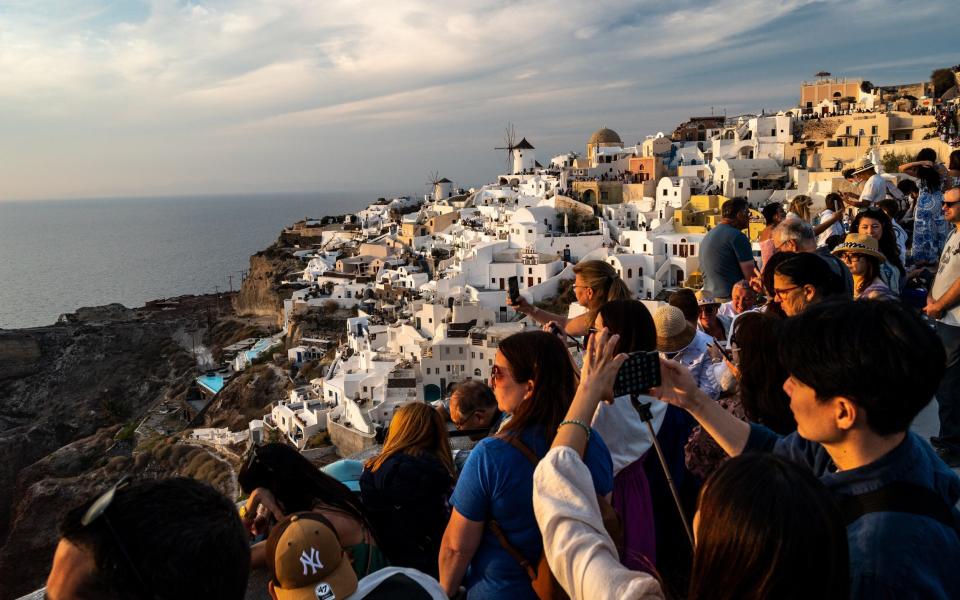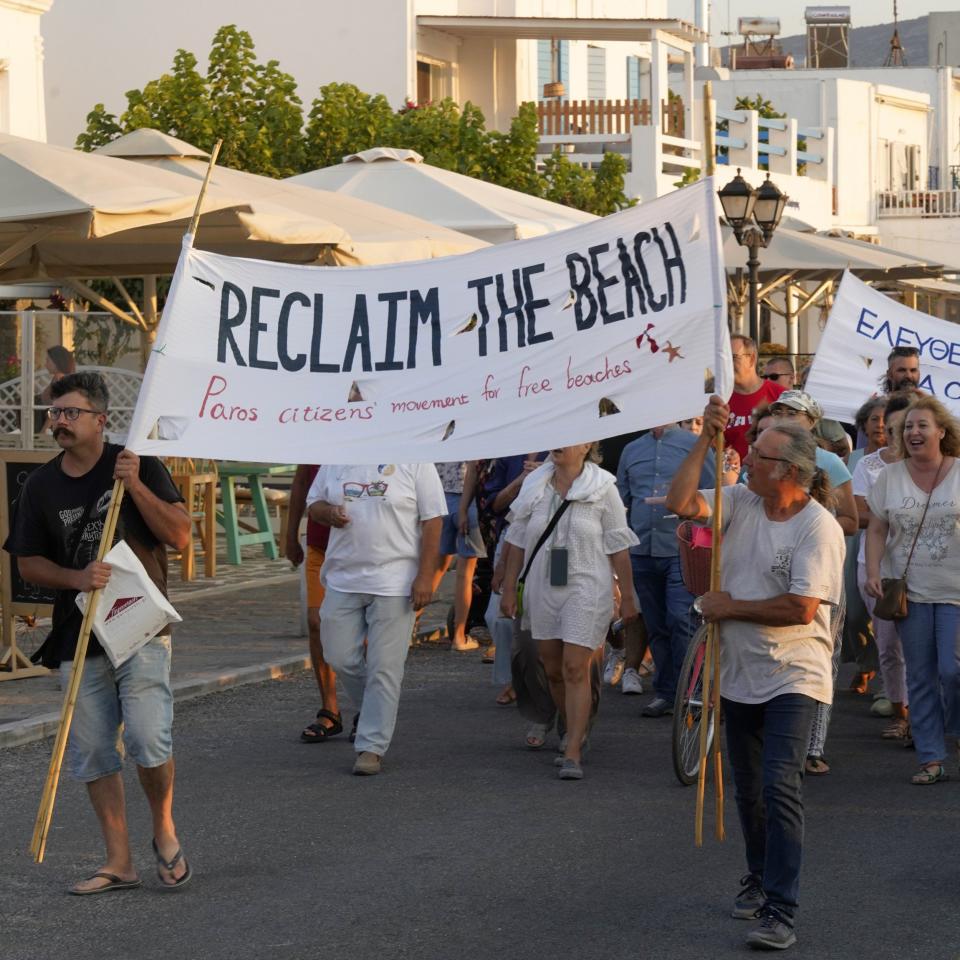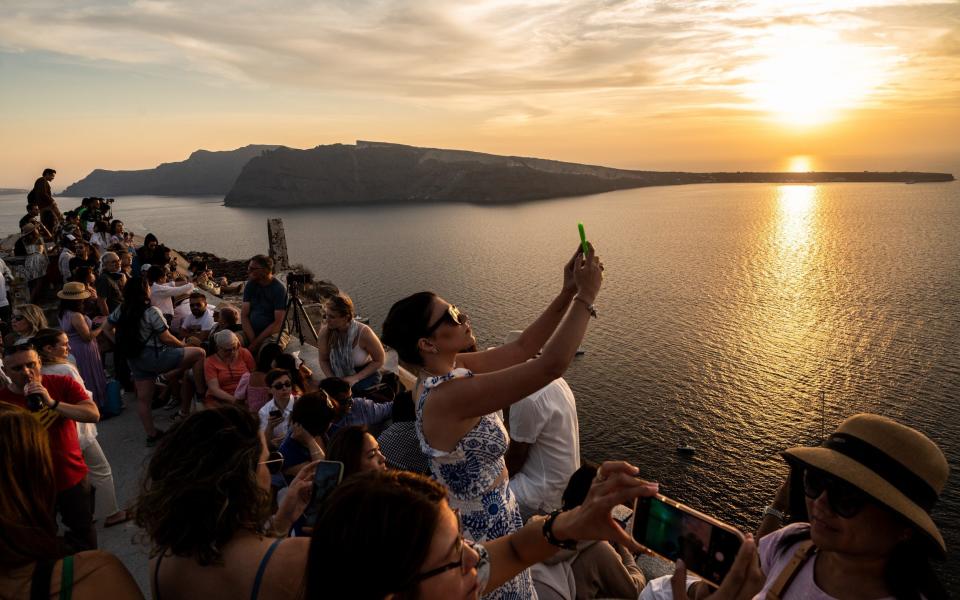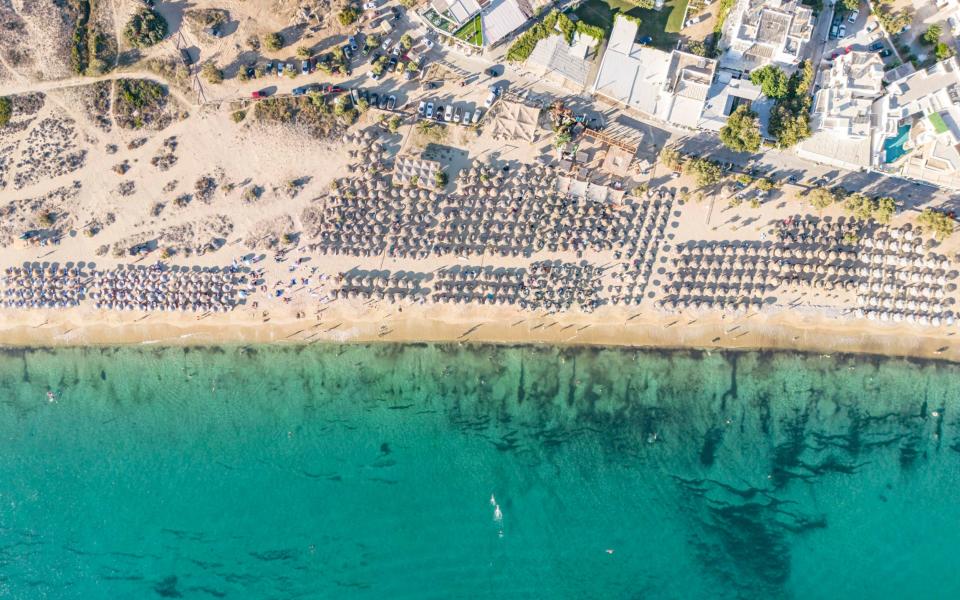How the Greeks are fighting to reclaim their islands from tourists

With one in five of the country’s 10.6 million inhabitants employed in the hospitality industry, Greeks have happily welcomed foreign visitors since the Seventies, when the country’s military junta was ousted and tourism really took off.
“I can remember coming to Santorini when I was a child in the 1950s, after the earthquake, and it was so terribly poor,” said Maria Diogenisis, one of the oldest inhabitants of Pyrgos, the island’s former capital. “This was not so long ago, but people forget.”
But 70 years on, Greeks are beginning to tire of mass tourism, which, as well as cash, brings with it a slew of issues for locals, from rising rents and strained infrastructure to ugly overdevelopment and a loss of access to beaches.
“On some islands, there are huge swathes of beach covered by sun loungers and parasols that are rented for up to €100 per day,” lamented Nicolas Stephanou, a member of the Paros Citizens’ Movement for Free Beaches who has lived on the island for 40 years.

The group protested this summer against what it claimed was the illegal privatisation of beaches and has inspired similar movements in the neighbouring islands of Naxos and Serifos, as well as on the mainland. Stephanou believed that the issue of beach access is the tip of the iceberg.
“Like elsewhere, the movement here on Paros was ignited by concerns about overdevelopment,” he said. “Locals felt like outsiders in their own community due to increasing frustration from invasive investors and a decline in their quality of life due to over-tourism. The situation on the beaches likely acted as the final catalyst.”
Tensions are also rising in Crete, and an incident earlier this summer saw a security guard allegedly assault a tour guide – to the fury of locals – after he attempted to swim from part of a beach fronted by a luxury hotel.
Mixalis Daskalakis, who works in a taverna near the hotel in question, said: “Under Greek law, beaches are considered public property, but they are leased by the government to hotels for lots of money. Because they pay lots of money, [the hotels] end up taking the whole beach instead of using the space they’ve been given. It’s a crazy system and it should be stopped.”
Plenty of other issues are making Greek islanders irate. On the party island of Ios, locals were up in arms about building works near Papas Beach, a 30-minute drive from the capital, Chora.
“They have built a luxury hotel and destroyed a wetland protected by presidential decree,” claimed one protester, who preferred to remain anonymous.
The construction of a bridge from Koubara Beach, on the opposite side of Ios, to the islet of Diakoftos also infuriated many. “Every island has a tragic story like this,” added the protester, pointing to the sale of what they said are protected areas – with “development potential” – on the northern coastline of Syros, another Cycladian island.
With some two million tourists flocking there each year, the tiny volcanic island of Santorini has become something of a cautionary tale. While shopkeepers and taverna owners may be happy to see crowded streets and picturesque alleys turned into selfie spots, inhabitants are far from amused.

In Oia, to which hordes head every evening for celebrated sunset views, locals have put up large blue signs asking for respect. “It’s your holiday, but it’s our home,” they read.
One homeowner fumed: “Yesterday, someone blocked my driveway with their quad bike for three hours while they went to watch the sunset, and then another girl tried to climb on my roof to take a photo.”
Other island inhabitants were angry at poor waste management, which led to overflowing rubbish bins and littered streets, and the traffic jams that afflict narrow, often badly maintained roads.
Nikolaos Zorzos, the island’s former mayor who is running for office again, said: “Here in Santorini, we face all the problems of a big city, even though we are not designed to be a big city or to deal with these problems.
“The local authorities in Greece also do not have the power and means to do things. We have to ask the central government to regulate local problems. A new law was meant to change things – to give more power and more means to local authorities – but the central government rejected it, so we are back to square one.”

The Greek Analyst, an anonymous blogger who writes about the country’s social, economic and political issues, agreed that there is a rising swell of discontent.
He said: “The problems caused by over-tourism in Greece are very real, especially in many of the Greek islands where the infrastructure has not been improved to support the level of demand they are experiencing.
“Even ferry tickets are unaffordable – even for middle-class Greeks with relatively comfortable salaries. It is not a coincidence that many people are reacting against these trends and have started asking that local authorities and government intervene.”
Although Greeks are up in arms about the results of over-tourism, their anger tends to be directed at what they perceive as the laxity of their own lawmakers and officials.
“I don’t like the term ‘over-tourism’ – the authorities and corporations profiting from the industry are as much, if not more, to blame, than the tourists,” said Nikos Boutsinis of Santorini Walking Tours, which focuses on taking visitors to unspoilt parts of the island.
“But for those who are concerned, there are more and more ways to help ease the pressure on the island, whether by travelling out of season, or visiting and staying in some of the lesser-known areas.”
Stephanou agreed: “Visitors need not be afraid – ours is a peaceful yet determined action to reclaim our beaches. Far from being worried about our movement, we have found that visitors from Britain show great enthusiasm for our cause and provide encouraging support.”

 Yahoo Sports
Yahoo Sports 